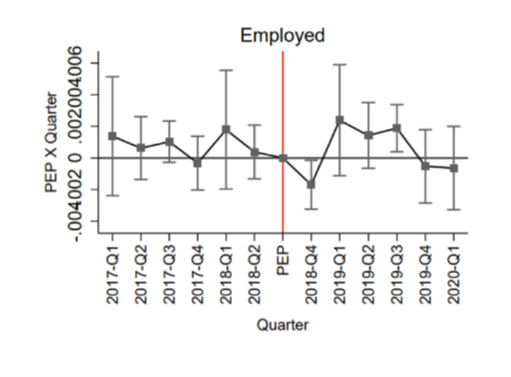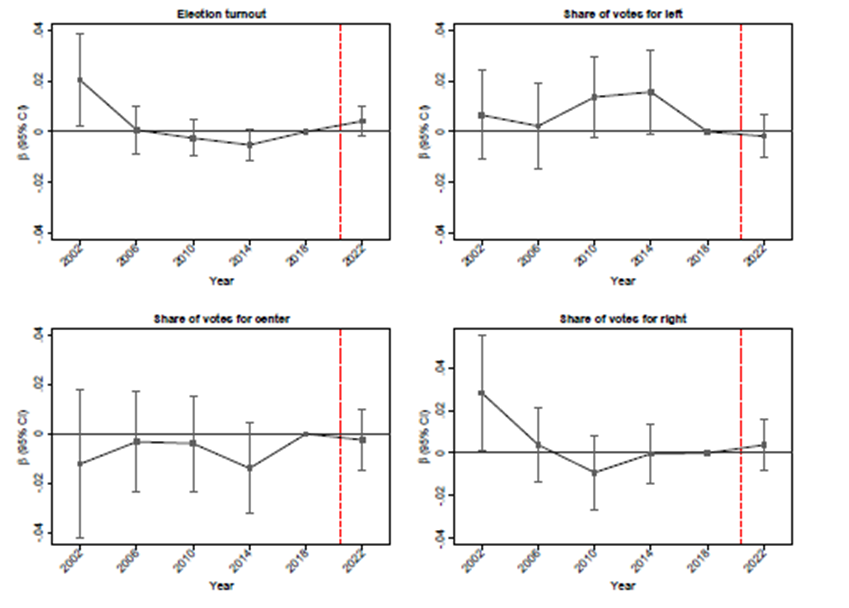
The regularisation of Venezuelan migrants had no significant effects on labour markets, political and social cohesion among Colombian natives, or crimes committed against Colombians while it enhanced the well-being and self-reliance of the forced migrants.
Editor's note: This article was authored by Sandra Rozo based on research, 'Life Out of the Shadows: The Impacts of Regularization Programs on the Lives of Forced Migrants.'
As forced migration continues to surge globally, particularly affecting low- to middle-income countries that host most of these migrants, the challenge of how to accommodate them with limited resources becomes increasingly complex. These nations often grapple with politically sensitive decisions around regularisation and work permit programmes, balancing the needs of their vulnerable populations against the potential impacts on labour markets and the risk of political backlash from their constituents. Unfortunately, many of these decisions are driven by fear and prejudice rather than evidence. Our recent work on the impacts of Colombia’s generous regularisation programme to Venezuelan forced migrants provides crucial insights for developing countries facing similar challenges. It provides evidence-based alternatives to support the self-reliance of forced migrants, especially as international humanitarian aid proves insufficient to sustain a growing number of protracted crises.
The Colombian experiment with regularisation
Cololmbia, the primary host of Venezuelan migrants, currently shelters 2.8 million Venezuelans, making up about 5% of its population. In a significant move, Colombia regularised all forcibly displaced migrants who arrived before 2021, granting them full work permits, mobility, and access to social protection services. This large-scale regularisation was an expansion of the 2018 PEP-RAMV programme (Permiso Especial de Permanencia por el Registro Administrativo de Migrantes Venezolanos, henceforth PEP), which had granted around half a million undocumented Venezuelan migrants job permits and access to social services. Eligibility for PEP-RAMV was based on pre-registration in the RAMV census, a survey conducted between January and June 2018 to count undocumented migrants before the programme's announcement in August 2018.
Over the past eight years, my co-authors and I have rigorously studied the impacts of PEP-RAMV using diverse data sources and empirical methods. This article summarises our key findings, offering valuable insights from Colombia’s experience to inform humanitarian policy and advance knowledge in this area.
No significant impact on Colombian workers, electoral behaviour or crime trends
Using difference-in-difference estimates and survey experiments we studied the effects of the PEP programme on workers' outcomes, electoral behaviours, and crime trends in Colombian municipalities (Bahar et al. 2021, Urbina and Rozo 2023, Ibañez et al. 2022). Our main findings suggest no significant effects on labour markets or on political and social cohesion among Colombian natives. However, we observed an increase in crimes reported by Venezuelan migrants, particularly incidents of sexual abuse involving female migrants, with no changes in crimes committed against Colombians.
The labour market impacts of regularisation in Colombia
Our analysis investigates the labour market impacts of the PEP programme on weekly hours worked, monthly wages, employment, and labour force participation among Colombian natives, Venezuelan migrants, and recently returned Colombian workers. We use confidential administrative data linked to department-level labour market outcomes, analysing both formal and informal sectors. Employing a difference-in-difference methodology and event studies, we compare areas with varying treatment intensities before and after the programme's implementation in August 2018. Our results show no significant effects of the PEP programme on hours worked, wages, or labour force participation among Colombian workers in either sector (Figure 1). The only notable effect is a small increase in formal employment among Venezuelan workers (Bahar et al. 2021).
The negligible impact of regularising approximately half a million migrants on the formal employment of native workers can be attributed to several factors:
- The composition of the labour force supply remained largely unchanged with PEP holders (Venezuelan migrants) primarily seeking access to public services rather than formal employment.
- Migrants already working in the informal sector may not perceive there to be benefits from formal employment due to additional tax costs and a lack of awareness about wage premiums in the formal sector as found in qualitative interviews.
- Labour demand dynamics may play a role, as Colombian firms might be reluctant or uninformed about hiring migrants with PEP status.
- The increase in labour supply could have triggered general equilibrium effects, such as increased aggregate demand that offset potential negative impacts on labour market outcomes.
These findings align with other studies on the effects of migrant inflows on labour markets (Clemens and Hunt 2019).
Figure 1: Impacts of the PEP programme in the employment likelihood of Colombian workers

Notes: The figure illustrates an event study that compare the employed probability of Colombian workers living in municipalities with higher and lower programme intensity, before and after the programme implementation. It illustrates that the programme had no effects on the employment rates of Colombian workers. The figure was taken from Bahar et al. (2021).
Electoral behaviours after regularisation in Colombia
Our analysis evaluates the effects of the PEP programme on electoral turnout, political support across ideologies, and electoral competition in Colombia by comparing election results in municipalities with varying PEP take-up rates before and after the programme's 2018 rollout. We find negligible effects on all outcomes for both mayoral and presidential elections, with coefficients close to zero, and similar results for the programme scalation in 2021. A survey experiment further reveals that Colombian adults are informed about the PEP programme and that providing additional information about the programme does not alter their prosocial behaviours toward migrants or their voting intentions. This result suggests that voter indifference rather than a lack of information explains the absence of a response to migrant-supportive policies (Rozo et al. 2023).
Figure 2: Impacts of the PEP programme in the electoral presidential outcomes in Colombia

Notes: The figure illustrates an event study that compare the electoral outcomes of Colombian workers living in municipalities with higher and lower program intensity, before and after the programme implementation. It illustrates that the programme had no effects on the electoral behaviours of Colombian workers. The figure was taken from Rozo et al. (2023).
How did regularising forced migrants affect crime trends in Colombia?
We employ a similar difference-in-differences approach to compare crime reports across cities with varying levels of treatment intensity, both before and after the programme's implementation. Our findings indicate that cities with a higher number of undocumented Venezuelan migrants applying for the PEP programme experienced an increase in crime reports. Notably, this increase is particularly significant for reports of domestic violence and sex crimes, predominantly driven by reports from female Venezuelans, a highly vulnerable group. To validate these findings, we cross-referenced our results with data on all prosecuted crimes in Colombia during the analysis period. The results consistently suggest that the programme did not lead to an increase in crimes by Venezuelan migrants, but rather an increase in the number of crimes they reported (Ibáñez et al. 2021).
Welfare gains for forced migrants from Venezuela
We collected unique longitudinal data for approximately 2,300 undocumented forced migrants that were or not eligible for the PEP-RAMV programme based on the date of arrival to Colombia. Those who arrived before June 2018 were eligible and those who arrived after were not. Yet, the programme was announced much later around August of 2018. Using this data and combining different methodologies such as regression discontinuity and panel data regressions we document that programme beneficiaries experienced large improvements in well-being including higher consumption per capita (a gain of 48%), increased monthly labour income (an increase of 22%) and better health status (an increment of 1.2 standard deviations). These positive outcomes largely stemmed from improved access to services, particularly the social protection system, subsidised healthcare system, and financial services (Ibáñez et al. 2024). We also observe that migrants eligible for the programme reduced their fertility due to improved access both to family planning services and labour market opportunities for women (Amuedo-Dorantes et al. 2024).
Fiscal gains for the Colombian government from regularising migrants
We make a simple accounting exercise to quantity the fiscal repercussion of the regularisation programme per regularised households. Using conservative assumptions, the results suggest that the fiscal costs of hosting a regularised forced migrant household are lower than those of an irregular one (Ibáñez et al. 2024). This result is explained by the fact that regularised migrants consume more and are less expensive in terms of health expenditures (they use preventive services more relative to emergency services). We base this analysis on a simple accounting exercise that only considers the short-term costs and benefits and does not incorporate the indirect benefits that migrants can bring to host countries, including firm capital tax contributions (Clemens 2021) and firm creation (Bahar et al. 2023). Hence, these estimates are a lower bound of the true fiscal income created by regularised migrants. It is remarkable that even in such a conservative exercise the programme induced net fiscal gains for the Colombian government.
The main take-aways for regularisation programmes
The Colombian experience is particularly informative for countries that have large informal sectors, and in which forced migrants might be part of the informal sector regardless of whether they have a work permit. In such instances, research shows that migrants will benefit from regularisation programmes even if they stay in the informal sector by improving their rights, labour market conditions, income, and consumption. Yet, most welfare gains for regularised migrants come from full access to health insurance and few of them will transition to the formal sector, at least in the short-term. This means that more support may be needed to facilitate the transition of newly regularised migrants from the informal to the formal sector. Moreover, the Colombian regularisation induced nearly null negative externalities for Colombian workers and no backlash in terms of political behaviours from voters. These might be explained by the fact that most migrants stayed in the informal sector and presumably also by the fact that Colombian and Venezuelan nationals have close historical ties. Finally, the government collected more revenue in terms of consumption taxes and new firms were subsequently created in Colombia.
All in all, the evidence suggests that facilitating migrant’s self-reliance creates few problems while ensuring sustainability for hosting forced migrants in the medium to long-run. So far, the Colombian experiment has proven to be a successful policy in the short-term and one that might induce even more positive effects in the medium to long-run. Those effects, however, remain to be studied.
Disclaimer: The findings, interpretations, and conclusions expressed in this article are entirely those of the author. They do not necessarily represent the views of the World Bank and its affiliated organisations, or those of the Executive Directors of the World Bank or the governments they represent.
References
Amuedo-Dorantes, C, M Ibáñez, S Rozo, and C Traettino (2021), “Fertility responses to regularization programs: Evidence from forced Venezuelan migrants in Colombia,” World Bank, Policy Research Working Paper No. 10431.
Bahar, D, B Cowgill, and J Guzman (2023), “Refugee entrepreneurship,” American Economic Association Papers Proceedings.
Bahar, D, M Ibáñez, and S Rozo (2021), “Give me your tired and your poor: Impact of a large-scale amnesty program for undocumented refugees,” Journal of Development Economics, 151: 102652.
Clemens, M A (2021), “The fiscal effect of immigration: Reducing bias in influential estimates,” CESifo Working Paper No. 9464.
Clemens, M A, and H Hunt (2019), “The labor market effects of refugee waves: Reconciling conflicting results,” Industrial Relations Research Association, 72(4): 818–857.
Ibáñez, A M, M Moya, S Rozo, and A Urbina (2024), “Life out of the shadows: The impacts of regularization programs on the lives of forced migrants,” Journal of European Economic Association, forthcoming.
Ibáñez, A M, S V Rozo, and D Bahar (2021), “Empowering migrant women,” World Bank, Policy Research Working Paper No. 9833.
Rozo, S, R Quintana, and A Urbina (2023), “The electoral consequences of easing the integration of forced migrants,” World Bank, Policy Research Working Paper No. 10342.





